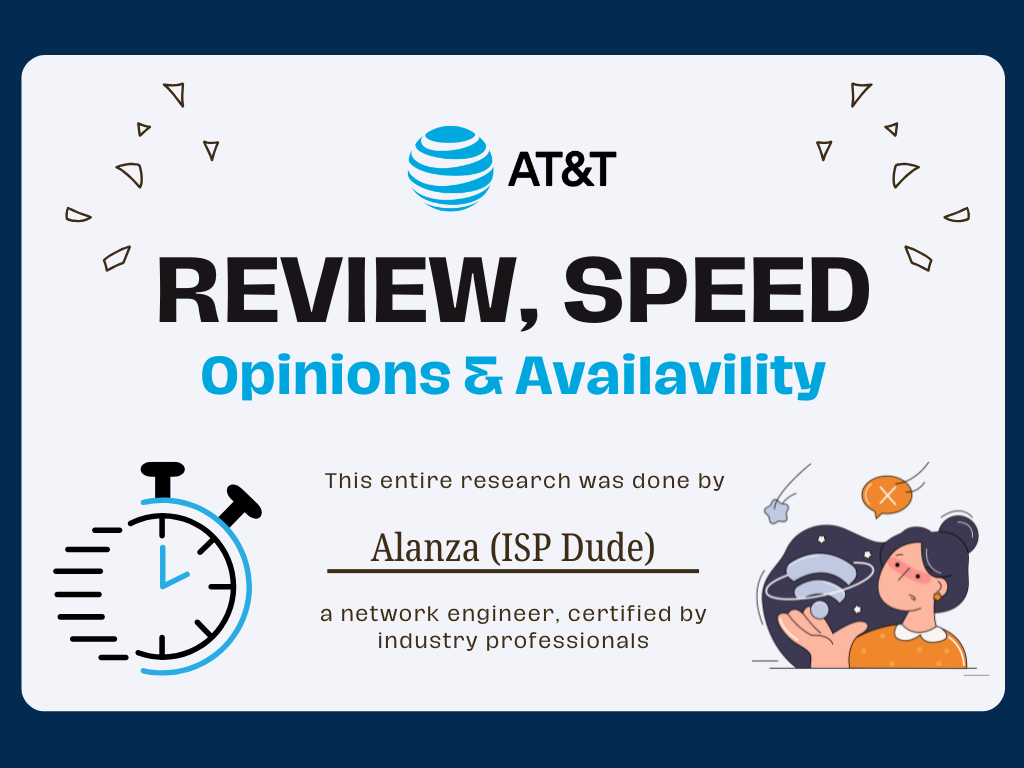You might be surprised to learn that AT&T’s fiber network reaches more than 28 million locations, making it one of America’s largest fiber providers.
If you’re considering AT&T Internet for your home or business, you’ll want to understand how their symmetrical speeds up to 5 Gbps and 99% uptime reliability stack up against the competition.
While their fiber plans have earned praise for consistent performance, their newer Internet Air service has received mixed reviews – and your specific location will determine which options you can access.
Key Takeaways
- AT&T offers fiber plans from 300 Mbps to 5,000 Mbps with symmetric speeds, starting at $55/month up to $245/month.
- Customers can save 20% by bundling with AT&T Wireless and receive an additional $10 discount for autopay enrollment.
- Fiber service boasts 99% reliability with symmetric speeds, while AT&T Internet Air delivers variable speeds between 40-350 Mbps.
- AT&T Fiber is available in over 100 major cities across 21 states, serving 28 million locations with plans to expand.
- New customers can receive up to $150 Visa gift cards with qualifying plans and get a free Wi-Fi gateway device.
AT&T Internet Plans Overview
When it comes to AT&T’s internet offerings, you’ll find three main service types: AT&T Fiber, AT&T Internet Air, and legacy DSL connections. AT&T Fiber stands as the company’s primary focus, delivering speeds ranging from 300 Mbps to an impressive 5,000 Mbps, with symmetric upload and download capabilities.
While DSL service is no longer available to new customers, AT&T Internet Air serves as an alternative in areas where fiber isn’t accessible.
AT&T Fiber plans start at $55 monthly for the 300 Mbps tier and scale up to $245 monthly for the premium 5 GIG plan. Each fiber plan includes unlimited data, no annual contracts, and zero equipment fees.
If you’re considering AT&T Internet Air, you can expect speeds up to 225 Mbps, making it a viable option in select regions, particularly throughout the Midwest, South, and parts of California.
The company’s coverage extends across 21 states, with fiber service available in over 100 major cities. New customers can receive free Visa gift cards worth up to $150 with qualifying plans.
You’ll also benefit from AT&T ActiveArmor security features and access to AT&T Wi-Fi hotspots with your service.
Pricing and Bundle Options
AT&T’s internet pricing structure straightforward, with fiber plans starting at $55 monthly for 300 Mbps and reaching $245 monthly for the top-tier 5,000 Mbps plan.
While AT&T recently implemented price increases of $5-$10 depending on your plan tier, you can offset costs through available discounts, including a $10 monthly savings when you enroll in autopay and paperless billing.
This pricing strategy aligns with industry-wide trends, as demonstrated by similar increases from providers like Cable One.
You’ll maximize your savings by bundling AT&T Fiber with an eligible AT&T Wireless plan, which reduces your internet costs by 20%. As a new customer, you’re eligible for additional perks, including an AT&T Visa reward card worth up to $150 when you select a plan between 300-1,000+ Mbps.
Data Usage and Overage Fees
AT&T’s data policies can impact your monthly costs as much as the base plan pricing. You’ll need to monitor your data usage carefully, especially if you’re on a plan with a limited allowance.
DSL customers receive 150GB monthly, Fixed Wireless users get 350GB, and Internet Basic through Internet 75 plans include 1.5TB. If you’re on Internet 100-5000 or AT&T Internet Air, you’ll enjoy unlimited data.
When you exceed your data allowance, AT&T charges $10 for each additional 50GB block, with maximum monthly overage fees capped at $100 for Internet plans and $200 for DSL and Fixed Wireless.
You’ll receive usage alerts at 65%, 90%, and 100% of your allowance via email, helping you avoid unexpected charges. If you’re consistently hitting your data cap, you might want to contemplate the unlimited data upgrade for $30 per month.
You can track your usage through the att.com Overview page, where you’ll also find tools to estimate your future data needs. Remember, your data usage includes all information sent and received through your home internet connection.
Speed Performance and Reliability
Boasting industry-leading fiber speeds up to 5 Gbps, AT&T delivers impressive performance across its internet service tiers.
You’ll find that real-world speeds often exceed advertised rates, with customers reporting consistently reliable connections that maintain promised performance levels.
AT&T’s fiber service claims 99% reliability, making it an excellent choice for users who can’t afford downtime.
Speed performance varies greatly between AT&T’s fiber and 5G home internet offerings.
While fiber provides symmetrical speeds and exceptional stability, AT&T Internet Air (5G) delivers variable speeds ranging from 40 Mbps to 350 Mbps, depending on network conditions and tower traffic.
- Fiber plans offer symmetrical speeds across all tiers, from 100 Mbps to 5 Gbps, with upload speeds matching downloads
- Actual tested speeds frequently surpass advertised rates, with 300 Mbps plans reaching nearly 400 Mbps
- Network reliability differs between services, with fiber achieving 99% reliability compared to 5G’s 74% approval rating
Connection quality depends on several variables, including the number of connected devices and your local network setup.
AT&T’s dedicated fiber connections provide superior stability compared to shared connections, particularly beneficial for users requiring consistent performance.
Customer Experience and Satisfaction
AT&T’s customer experience and satisfaction have been a subject of much discussion, with both positive and negative reviews. While the company has made strides in improving its service, there are still areas where it can enhance its offerings.
Positive Aspects:
- J.D. Power Rankings: AT&T has consistently ranked high in J.D. Power’s customer satisfaction surveys, particularly for business wireless and wireline services. This suggests that the company is delivering a positive experience to many of its business customers.
- Network Reliability: AT&T has invested heavily in its network infrastructure, leading to improved network reliability and faster speeds. This is especially important for customers who rely on their mobile devices for work and entertainment.
- Customer Support: While customer support can be inconsistent, many customers have reported positive experiences with AT&T’s customer service representatives, who have been helpful and knowledgeable.
Negative Aspects:
- Billing Issues: A common complaint among AT&T customers is billing errors and unexpected charges. This can be frustrating and damaging to customer trust.
- Limited Service Availability: AT&T’s service coverage can be patchy in certain areas, particularly in rural regions. This can be a significant drawback for customers who need reliable connectivity on the go.
- Complex Plans and Contracts: AT&T’s service plans and contracts can be confusing and difficult to understand. This can lead to customer dissatisfaction and frustration.
Recent Reviews:
A quick search of recent reviews reveals a mixed bag of experiences. Some customers praise AT&T’s customer service and network reliability, while others complain about billing issues, poor customer service, and limited service availability.
One Positive Review:
“I’ve been an AT&T customer for years, and I’ve always been satisfied with their service. The customer service representatives are always helpful and knowledgeable, and I’ve never had any major issues with my service.”
One Negative Review:
“I’ve had nothing but trouble with AT&T. I’ve been charged for services I didn’t sign up for, and the customer service representatives have been unhelpful. I’m switching to a different carrier as soon as my contract is up.”
Service Coverage and Expansion
AT&T’s ambitious fiber expansion reaches over 28 million locations today, with plans to serve more than 30 million by 2025.
Their coverage strategy combines organic growth, joint ventures, and strategic partnerships, including their Gigapower initiative that’s set to expand beyond 1.5 million locations.
Through new agreements with commercial open-access providers like Boldyn Networks and Digital Infrastructure Group, AT&T’s continuing to broaden its footprint considerably.
The company’s commitment to accessibility extends beyond urban centers, with notable developments in rural and underserved areas:
- A $5 billion commitment through 2030 to help bridge the digital divide
- Expansion of network coverage on Tribal lands by more than 40%
- Public-private partnerships leveraging federal BEAD funding for high-speed deployment
You’ll benefit from AT&T’s integrated approach to connectivity, combining 5G wireless and fiber services to deliver extensive coverage.
Their wireless network reaches 295 million people across 24,500 cities and towns, while their fiber infrastructure continues to grow through various expansion models.
Special Offers and Discounts
When it comes to savings, the telecommunications giant rolls out an impressive array of discounts and special offers.
You’ll find significant value in AT&T’s bundle options, where you can secure a 20% discount on AT&T Fiber or Internet Air by pairing it with an eligible wireless plan.
Additionally, you can save $10 monthly by enrolling in Autopay and paperless billing using a debit card or bank account.
The standalone internet plans come with their own attractive incentives. AT&T Fiber tiers (300, 500, and 1000) include Visa Reward Cards valued at $50, $100, and $150 respectively.
You can boost these rewards by an extra $100 when placing your order online with the code “HOLIDAY100.” If you’re considering switching to AT&T, you’ll find up to $360 in credits over 36 months when bringing your own smartphone.
Special discounts extend to military personnel, teachers, doctors, and nurses through unlimited data plans, while business customers can save up to $110 monthly on bundled services, with an additional $30 monthly savings when including wireless service.
Learn about other internet service providers
- Spectrum Review
- Verizon Fios Review
- HughesNet Review
- Cox Review
- Xfinity Review
- Google Fiber Review
- T-Mobile Review
Frequently Asked Questions
Can I Keep My Existing Email Address When Switching to At&T Internet?
Like a bridge connecting two shores, you’ll keep your existing email when switching to AT&T internet. You can even set up auto-forwarding to smoothly shift between providers.
What Happens to My Service During Power Outages?
During power outages, you’ll lose your internet service unless you have a backup battery. You can maintain connectivity by using your mobile data or connecting to alternative Wi-Fi networks with power.
Does At&T Provide Wi-Fi Equipment for Free With Service?
You might think you’d have to pay extra, but AT&T actually includes your Wi-Fi gateway device at no additional cost with all their fiber internet plans – it’s bundled into your monthly rate.
How Long Are At&T Internet Contracts, and What Are Early Termination Fees?
You’ll typically have a 12-month contract with AT&T Internet, though no-contract options exist. If you cancel early, you’ll pay termination fees that decrease by $15 for each completed month.
Can I Use My Own Router With At&T Internet Service?
You can use your own router with AT&T internet, but you’ll need one that’s compatible with their network protocols and might face some technical limitations or reduced support.


Leave a Reply